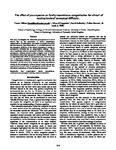The effect of pre-exposure on family resemblance categorization for stimuli of varying levels of perceptual difficulty
| dc.contributor.author | Milton, F | |
| dc.contributor.author | Copestake, E | |
| dc.contributor.author | Satherley, D | |
| dc.contributor.author | Stevens, T | |
| dc.contributor.author | Wills, Andy | |
| dc.date.accessioned | 2014-08-12T08:26:12Z | |
| dc.date.accessioned | 2014-08-12T08:26:39Z | |
| dc.date.available | 2014-08-12T08:26:12Z | |
| dc.date.available | 2014-08-12T08:26:39Z | |
| dc.date.issued | 2014-08-12 | |
| dc.identifier.isbn | 9780991196708 | |
| dc.identifier.uri | http://hdl.handle.net/10026.1/3066 | |
| dc.description.abstract |
This study investigated the effect that pre-exposure to a set of stimuli has on the prevalence of family resemblance categorization. 64 participants were tested to examine the effect that pre-exposure type (same-stimuli vs unrelated-stimuli) and the perceptual difficulty of the stimuli (perceptually similar vs perceptually different) has on categorization strategy. There was a significant effect of perceptual difficulty, indicating that perceptually different stimuli evoked a higher level of family resemblance sorting than perceptually similar stimuli. There was no significant main effect of pre-exposure type; however, there was a significant interaction between pre-exposure type and level of perceptual difficulty. Post-hoc tests revealed that this interaction was the result of an increase in family resemblance sorting for the perceptually different stimuli under relevant preexposure but no such effect for perceptually similar stimuli. The theoretical implications of these findings are discussed. | |
| dc.format.extent | 1018-1023 | |
| dc.language.iso | en | |
| dc.publisher | Cognitive Science Society | |
| dc.relation.replaces | http://hdl.handle.net/10026.1/3065 | |
| dc.relation.replaces | 10026.1/3065 | |
| dc.title | The effect of pre-exposure on family resemblance categorization for stimuli of varying levels of perceptual difficulty | |
| dc.type | conference | |
| dc.type | Conference Proceeding | |
| plymouth.author-url | http://www.willslab.co.uk/ | |
| plymouth.publication-status | Published | |
| plymouth.journal | Proceedings of the 36th Annual Conference of the Cognitive Science Society | |
| plymouth.organisational-group | /Plymouth | |
| plymouth.organisational-group | /Plymouth/Admin Group - REF | |
| plymouth.organisational-group | /Plymouth/Admin Group - REF/REF Admin Group - FoH | |
| plymouth.organisational-group | /Plymouth/Faculty of Health | |
| plymouth.organisational-group | /Plymouth/REF 2021 Researchers by UoA | |
| plymouth.organisational-group | /Plymouth/REF 2021 Researchers by UoA/UoA04 Psychology, Psychiatry and Neuroscience | |
| plymouth.organisational-group | /Plymouth/Research Groups | |
| plymouth.organisational-group | /Plymouth/Research Groups/Institute of Health and Community | |
| plymouth.organisational-group | /Plymouth/Users by role | |
| plymouth.organisational-group | /Plymouth/Users by role/Academics | |
| dc.publisher.place | Austin, TX | |
| dc.rights.embargoperiod | Not known | |
| rioxxterms.licenseref.uri | http://www.rioxx.net/licenses/all-rights-reserved | |
| rioxxterms.type | Conference Paper/Proceeding/Abstract |


